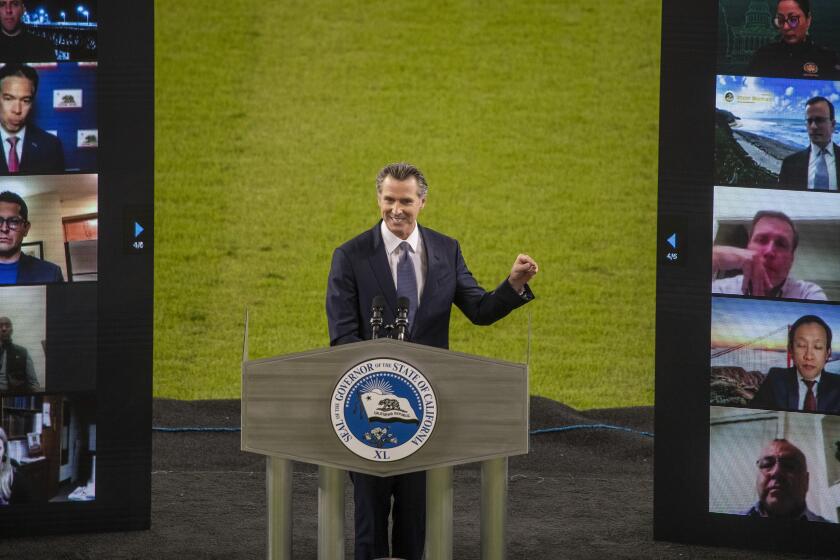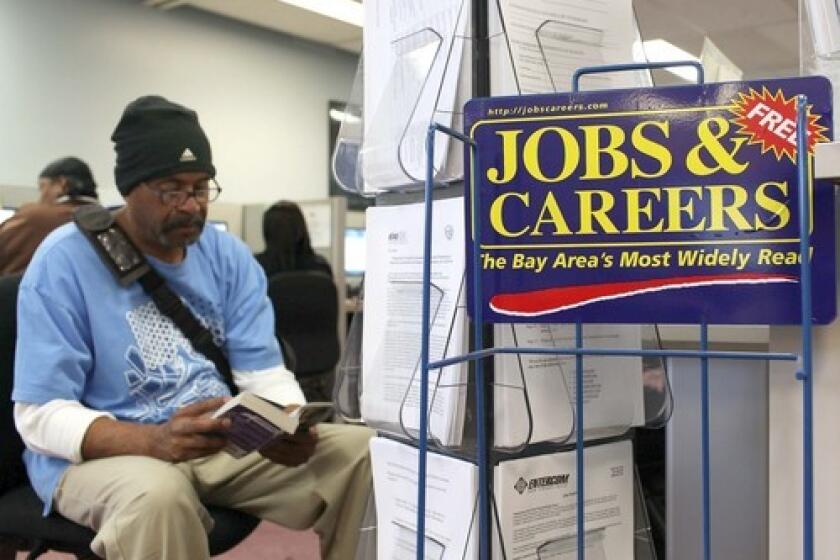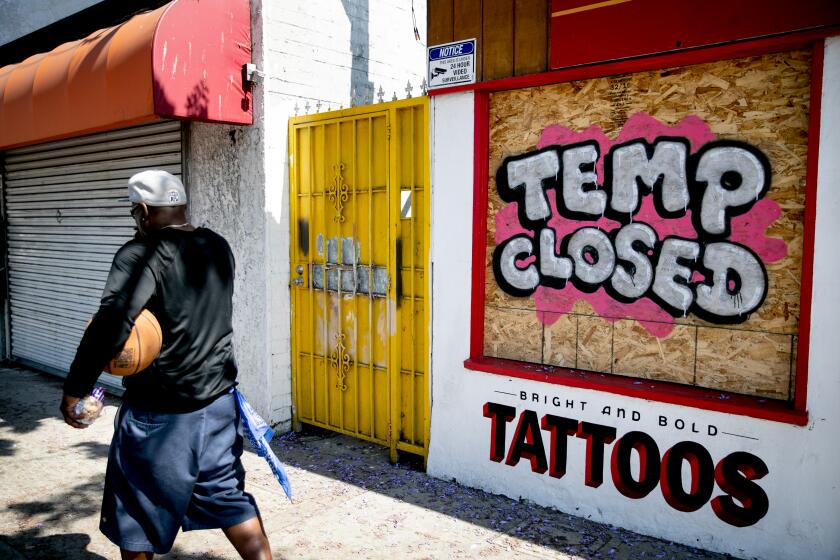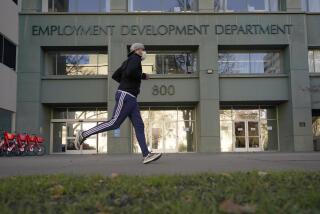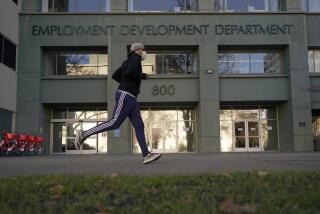Lawmakers push reforms at state unemployment agency as the jobless face new delays
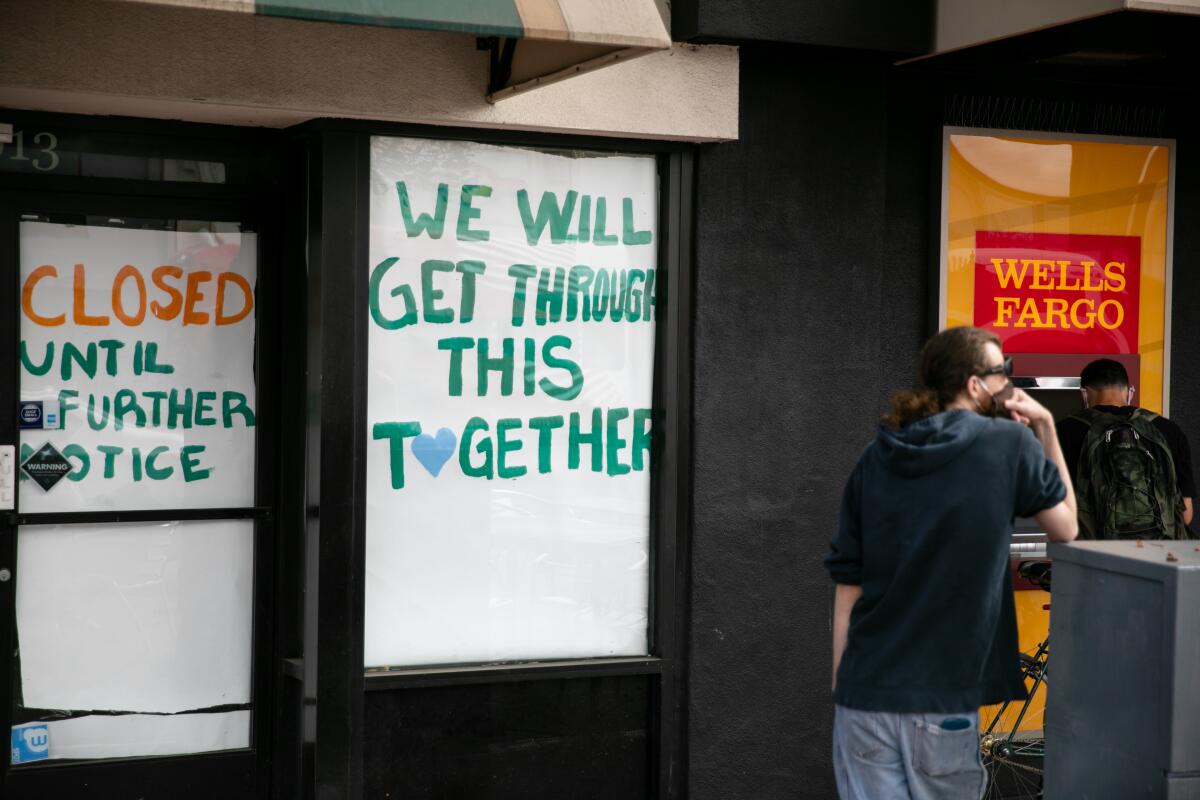
California legislators on Thursday pushed ahead with reforms targeting the state’s troubled unemployment agency as lawmakers condemned it for yet another significant error that has interrupted benefit payments to thousands of jobless residents.
Agency officials apologized for a new computer glitch that has prevented many people from filing new claims online, but lawmakers note it is just the latest in a string of technological problems that have plagued the state Employment Development Department since the pandemic began more than a year ago.
A package of bills to help overhaul EDD’s operations approved Thursday by a key legislative committee would allow direct deposit of unemployment benefits, provide written instructions in more languages on how to get benefits, and require the agency to better explain to claimants why they have been disqualified from receiving financial assistance
Meanwhile, federal regulators have begun looking at how Bank of America, which contracts with the EDD to issue debit cards to deliver benefits, has handled a flood of fraudulent unemployment claims with actions that included freezing accounts, affecting some people who are legitimately in need of financial aid.
“Californians relying on unemployment benefits during the pandemic have been let down time and time again,” said Assemblyman Phil Ting (D-San Francisco), chairman of the Assembly Budget Committee. “Whether they’re trying to resolve fraudulent charges, access their money or simply want to talk to a real person on the phone, significant delays in solving problems have caused needless suffering.”
The EDD continues to struggle with an unprecedented number of claims amid the COVID-19 pandemic. The agency has processed 21.7 million claims since March 2020 and paid $137 billion in benefits, and is taking steps to ensure claimants receive a $300 weekly supplemental payment recently approved by Congress.
The governor’s address came after the EDD said its backlog of delayed, unapproved claims has doubled since the start of the year to more than 1 million.
“Our goal is to make this as seamless a transition as we can so there is little interruption,” EDD spokeswoman Loree Levy said.
Many people have reached the end of their first benefit year and must file new claims to continue getting assistance. But the process has been filled with obstacles for scores of claimants: EDD officials told the Legislature this week that 178,000 people faced a system glitch that prevented them from immediately filing new claims.
“The issue arose when customers were not able to select the ‘File New Claim’ button within their UI online account,” Levy said.
EDD officials publicly apologized and said they hope to resolve the problem as early as Friday, but state Senate Minority Leader Scott Wilk (R-Santa Clarita) said the interruption of benefits is just “the latest EDD debacle.”
“One hundred seventy-eight thousand other Californians just joined the fastest-growing club in the state: unemployed Californians screwed by the EDD,” Wilk said.
Once the technical problem is fixed, many people will still be weeks away from receiving benefits. While they will be able to file new claims, they still must go through an approval process, including identity verification that can take three weeks or more to complete.
The EDD has a backlog of more than 121,900 claims that are more than three weeks old and awaiting action by the agency. The agency said an additional 911,000 claims have been delayed while awaiting action by the claimants, although many people say they have complied with requests for information and the EDD is still holding back approval.
The glitch identified this week is in addition to other long-standing issues that unemployed people are continuing to report, including overwhelmed phone lines at the agency call center.
California’s unemployment agency was not prepared for the COVID-19 pandemic, an emergency state audit confirmed this week. Many of its issues with processing claims have been ignored for more than a decade.
Charles Shepler, a Los Angeles resident who lost work as a store clerk, said he has not been paid benefits since November after the EDD flagged his account for having an out-of-state driver’s license. He said he has uploaded current identification documents five times, but the EDD has not resumed paying his benefits.
“I called over 110 times,” he said. “I’ve spoken to so many different representatives. None of them have given me the same answer twice.”
Shepler said the delay in benefits has left him resorting to sleeping in a trailer behind a church.
“They have caused me a lot of hardship because of this,” he said. “It is absolutely horrible what they’ve done to myself and other people.”
Tracey Schneider was laid off on March 19 from her job at a Walnut Creek insurance company and said she has been unable to get benefits. Her file is still marked “pending,” though she said she has gone through the certification process every two weeks.
“I just need to know, did I do it correctly? Is it going through? Is it denied?” she said. “The not knowing part is just killing me.”
Many unemployed people do not have the necessary technology to verify their identity online through the ID.me system that is required before new claims can be approved, said Daniela Urban, executive director of the Center for Workers’ Rights, an advocacy group
“We are seeing many claimants who are facing difficulties in reapplying for benefits at the end of their benefits year,” she said.
When the state began using ID.me last fall, officials projected it would result in 91% of claims being automatically verified online, speeding up the process. However, EDD officials said that in January the agency reinstated the use of determination interviews to seek to resolve eligibility issues that might disqualify people from getting unemployment benefits.
“With that manual workload demand up over the last couple of months, we’ve been averaging around 60% automated claim processing,” Levy said, adding that the agency is continuing to “look for ways to add resources and automation to reduce manual workload.”
This week, Senate Democrats released a state budget proposal calling for an unspecified amount of money for making “systems modernization and program improvements” at the EDD.
In addition to the confirmed fraud, the state has stopped tens of billions of dollars in payments on bogus claims through tougher security measures, officials said.
On Thursday, the Assembly Insurance Committee voted unanimously with bipartisan support to approve a trio of reform bills, including one by Assemblywoman Lorena Gonzalez (D-San Diego) that would allow jobless people to have their benefits directly deposited in their bank accounts instead of using the current system in which the EDD, through Bank of America, issues debit cards through the mail.
Gonzalez noted there have been widespread reports of debit cards being stolen, hacked or issued to fraudulent claims without the knowledge of the person whose name is on the cards.
“Too many Californians have had to wait months to be approved for unemployment benefits, only to run into problems with their debit card,” Gonzalez said Thursday. “This bill will let families rest easier knowing the benefits they depend on will be there when they need them.”
EDD officials have estimated that at least $11 billion has been paid out on fraudulent claims, and the state auditor said that includes $800 million paid improperly in the names of prison and jail inmates.
In response to a barrage of fraudulent activity, Bank of America froze hundreds of thousands of EDD debit cards, but some legitimately unemployed people say they have had their benefits frozen as well. The bank is facing federal lawsuits in San Francisco and San Diego alleging that it failed to protect EDD benefits from fraud.
State officials say they have also been notified that the federal Consumer Financial Protection Bureau and the Office of the Comptroller of the Currency are reviewing how the claims were handled by the bank.
Federal officials declined to comment. Bill Halldin, spokesman for Bank of America, said the bank is working to counter widespread fraud and noting that “as a matter of policy, we don’t comment on the existence of regulatory inquiries.”
“However, as California’s unemployment program faces billions of dollars in fraud, Bank of America is working every day with the state to prevent criminals from getting money and ensuring legitimate recipients receive their benefits,” he added.
Assemblywoman Cottie Petrie-Norris (D-Laguna Beach) welcomed the federal review.
“Californians experienced account freezes leaving them without their benefits,” she said. “At the end of the day, an investigation will provide more transparency and accountability and, I hope, some long-standing solutions to protect taxpayer dollars.”
U.S. Sen. Dianne Feinstein (D-Calif.) wrote Thursday to the federal bureau asking them to take further action.
“To the extent that the CFPB finds any evidence of negligence or wrongdoing on the part of Bank of America, I ask that you do everything within your power to ensure that any Californians harmed by those actions are helped, and to make such recommendations to Congress as may be warranted,” Feinstein wrote.
More to Read
Start your day right
Sign up for Essential California for news, features and recommendations from the L.A. Times and beyond in your inbox six days a week.
You may occasionally receive promotional content from the Los Angeles Times.
